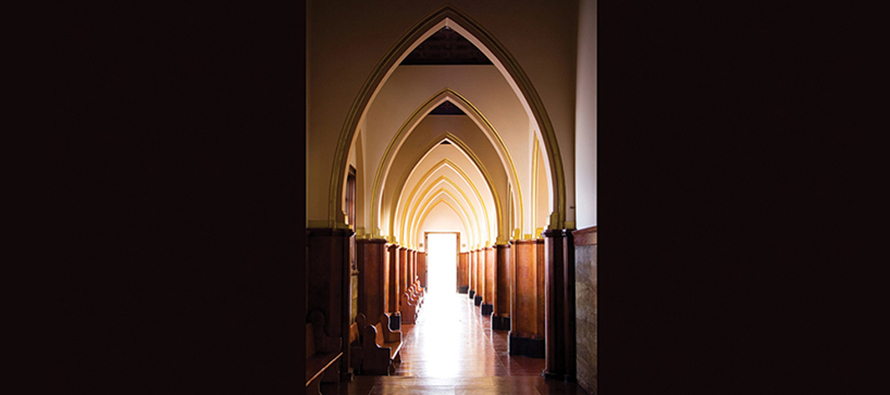Enter into the divine

WERE SOMEONE to tell us, as Catholics, that in the liturgy God becomes present to humanity, most would not disagree. At least, not with the idea. But, in our weekly or daily encounter with the liturgy, we often feel as though we witness nothing so serious.
Indeed, the tepidness of parishioner’s response at Mass has become the norm rather than the exception. And such a split between our idea and experience is a symptom of our real sense of a personal disconnect from liturgy. We resign ourselves to the role of spectators, judgers of music and prayer from the altar, who occasionally chime in or pray silently. But, whether we deem the experience moving or dull, we nevertheless overlook the only liturgical action that can make it personal: the action of God.
The question of whether Mass was moving and effective has become concerned with the quality of the priest’s homily, the choir’s singing, the congregation’s gusto. Unfortunately, there will always be parishes with uninspired homilies and wretched singers; the church is too large for greatness to be uniform. Nevertheless, cannot—and should not—the liturgy be internally rich and fulfilling for parishioners even in these places? How can we as Catholics take personal ownership over the quality of our liturgical experience and “make it our own”?
Liturgy is divine
In attempts to make the laity feel more involved in Mass, parishes multiply the various actions (such as the Presentation of the Gifts) that involve the laity into the ritual. Parishioners and liturgists demand also that the music be made contemporary, relatable, what the youth love. Yet, through these innovations we often experience nothing grander. We may feel as though we are less in the midst of a miracle than amongst our own creative energies, a jam session.
By placing primacy on the entrance of ourselves into the liturgy, we undermine the Mass as a gift from God. As Pope Benedict XVI said, “If the various external actions . . . become the essential in the liturgy, if the liturgy degenerates into general activity, then we have radically misunderstood the ‘theo-drama’ of the liturgy and lapsed into parody.”
The predominance of God’s liturgical action is perhaps better conveyed by the Eastern Christian word for the Mass: The Divine Liturgy. Here, the very “catholic” notion (in the West as well as the East) that our form of worship is a gift from God finds full emphasis. It is the received form of liturgy, made concrete in rite, that permits us to receive the Body of Christ.
For this reason, the very action that can personally bring us into the liturgy is, as the pope puts it, “participation in the action of God” in the Eucharistic Prayer. When we pray for God to accept our sacrifice and to incarnate before us, the role of the parishioner is no less than that of the priest. There is no performance, but petition. God makes himself accessible to us so that, through our own earthly materials, we can communicate with him in a personal way. As long as this happens, I can never say a liturgy was “ineffective,” no matter the speaker or the cantor.
Receive the Other
As for me, I do look to the Mass as outside of me, and thank God that it is. But the Mass is external, not in that it belongs to the culture of some past, and now irrelevant, generation, but in that it belongs to no one on earth; it is divine. And only when I understand that Mass is not of my own in origin (or the priest’s or liturgist’s) does it become my own in reception.
Indeed, there are few things more personal than receiving a gift from another. And were I truly to accept this gift as Wholly Other—with all the discomfort and incongruity with contemporary culture it brings—I would make a truly religious movement. This, for me, is the difficulty of attending Mass. I must train myself to accept the Wholly Other God, who inexplicably makes himself into flesh for my sake and yours.
Tags
Related
- Questions Catholics Ask
- What Catholics believe about the Eucharist
- How Jesus embraced his call
- Prayer: Our never-ending conversation with God
- What the church is teaching—and learning—about the sin of racism
- Church defined: Jesus calls; we respond
- A Creed to believe in
- On whose authority?
- Ten great things about being Catholic
- Following Jesus: Be ready for some surprises Read More
Most Viewed
- Find your spirituality type quiz
- Questions and answers about religious vocations
- Celibacy quiz: Could I be a nun? Could I be a brother? Could I be a priest?
- Resources for older discerners or those with physical and developmental differences
- About Vocation Network and VISION Guide


 Sean Reynolds is a recent graduate of Saint Xavier University with a B.A. in English. Currently he lives and works in Chicago and is applying to graduate school.
Sean Reynolds is a recent graduate of Saint Xavier University with a B.A. in English. Currently he lives and works in Chicago and is applying to graduate school.